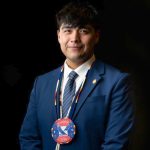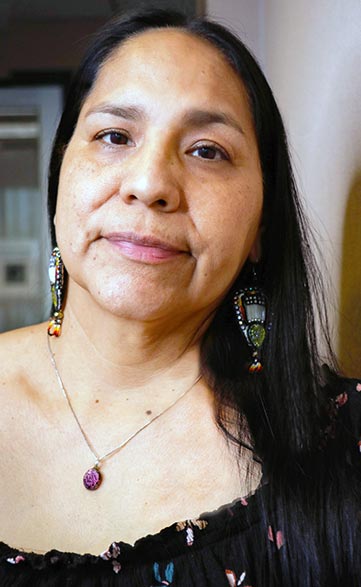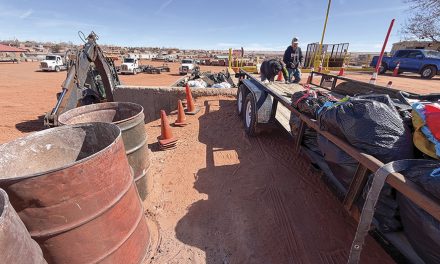
Guest Column | When justice is denied, women help women heal
By StrongHearts Native Helpline
“It’s for every survivor like Lisa, who never got their day in court and for every family that feels like justice is beyond reach and for every tribal community struggling to keep its people safe that I’ll be signing the Tribal Law and Order Act into law today,” said President Barrack Obama on July 29, 2010.

Courtesy photo | Stronghearts Native Helpline
Lisa Marie Iyotte, a member of the White Clay People Tribe, is a survivor of rape and a beating on the Rosebud reservation in 1994.
Lisa Marie Iyotte is a citizen of the Fort Belknap “White Clay People” Tribe, her father’s tribe, but grew up Lakota on the Rosebud Indian Reservation (her mother’s tribe) in a town called Saint Francis, a name adopted from the St. Francis Indian boarding School.
She’s a traditional woman that carries with her a thousand voices of Native women who for centuries have been silenced.
As an Indigenous woman, Lisa has the lived experience created by more than 500 years of being stalked, captured, subjugated, trafficked, maimed and murdered by non-Native colonizers.
As a survivor, she and generations before her faced violence, devastation and assimilation on a scale that normalized rape culture and, more often than not, no clear path to justice.
Moving home
In 1994, Lisa moved back to the Rosebud reservation as a married mother of two girls. Her house was located in a bad neighborhood where her husband worked in law enforcement.
The marriage dissolved and left Lisa a single mother at 25 years of age.
On May 15, 1994, a day after celebrating the birthday of her three-year-old daughter, Lisa spent the day cleaning house as she would any other Sunday.
After she put the girls to bed, Lisa was tired and fell asleep on the couch. The living room lamp was still on when she woke to a knock on the door.
She turned on the porch light and peered through the window. She recognized the man and answered the door.
He told her that he’d been stabbed and asked if she would call a number for help. While she closed the door to call for help, she found there was no answer.
When she reopened the door to let him know, he had twisted the porch light bulb off and covered his face. Until that moment, Lisa would have helped anyone who needed it.
“He came in the door and started to hit me,” said Lisa, who fought back. “We knocked over the lamp and I kept fighting him.”
She worried about her sleeping girls and thought she should be quiet, but it was too late. She saw the girls standing there crying when he got on top of her and covered her mouth.
She bit him and told her girls to go back to their room and lock the door.”
Aftermath
By the time he left, Lisa’s injuries were substantial. The perpetrator bit her face leaving teeth marks that needed to be stitched.
There was blood everywhere, but she couldn’t call for help because he had taken her phone. She couldn’t leave because he pushed her car out of sight.
“I put on pants and pajama top and went through the house and turned on all the lights and made sure everything was locked,” she said. “My girls were hiding, and I couldn’t find them.”
Her eldest daughter, just four years old, hid under the bed, but not before hiding her little sister under a Raggedy Ann doll in the closet.
Neighbors heard the brutal attack and came to check on her. They called the police and ambulance. If not for her neighbors, Lisa would have had no access to medical care or law enforcement.
“My cousin had a scanner and heard what happened when they gave the code and said my name,” she explained. “My cousin and mom came over and when the police arrived, I told my cousin to take the girls because I didn’t want them to see me.”
Lisa stayed the night at the hospital waiting for the sexual assault nurse to do the rape kit.
She was out of it — her mind wasn’t right — she couldn’t remember things when her mother snapped her back to reality.
“I was asking where my daughters were when my mom said, ‘You’ve asked me several times and I’ve told you several times,’” Lisa remembered. “I didn’t ask her again.”
“My face was all beat up, one of my eyes was all red so they wanted me to go to the eye clinic and get it checked out,” she explained, remembering the embarrassment as she was wheeled through the hospital to the clinic.
By then it was morning and there were a lot of people. Though she would bear a scar, her eye exam revealed no permanent damage.
Lisa’s mom, grandma and aunt waited with Tillie Black Bear and behavioral health counselor Bernie Waln in the ER. Upon Lisa’s return, they decided it was best for the girls not to see her until she healed for a time. Lisa returned home two weeks later.
“That’s when I realized how much I had forgotten,” said Lisa, explaining that while giving her daughter a bath she asked, ‘Did that happen when that guy was on top of you?’
It would be awhile before all the pieces came back together.
Justice denied
Although law enforcement came and took photos of her injuries, Lisa couldn’t put a name or face to her rapist.
Like many other sexual assault victims, Lisa experienced a memory block of the trauma and for the longest time she didn’t recognize him.
After six months of inquiries, Rosebud tribal investigators explained to Lisa that even though there was a DNA match from the rape kit, federal prosecutors declined to prosecute because the perpetrator did not use a weapon.
Although the Bear Butte Lodge Retreat Center located near Sturgis, South Dakota was destroyed by fire in June 2021, the butte remains a sacred place to the Rosebud Tribe.
Lisa remembered her own healing journey at the Women’s Camp held at Bear Butte.
“When we were at one of the sessions, we explored seven teachings,” said Lisa, adding that there were seven helpers and seven women who shared their stories using a variety of mediums including art, massage, talking sticks, journaling, making tobacco ties and participating in guided talks throughout the day.
“We always ended our sessions with a ceremony,” said Lisa. “We wrote the perpetrator’s name on a piece of paper and burned it. We said his name out loud to remove it from our body.”
During the women’s camp, Lisa shared that after the assault her father wanted her to move to Seattle. It was something she wanted to do prior to the assault, but after the assault she refused, concluding: “Even though this guy did something horrific to me and my girls witnessed it, he’s not going to take anything else from me.
“This is my home, where I live, where I grew up,” she said, “and no, he is not going to take anything else.”
Saying that changed the trajectory of another victim’s life. Years later, a woman told Lisa that because of her words, she was no longer scared or living in fear anywhere.
“That’s the big takeaway from the women’s camp. For three days, we were all together — women helping women,” Lisa explained. “I’m not going to give him anything more and by saying that I gave her some strength. That’s what the women’s camp did.”
Justice served
Angelo Duval Young raped another woman and then a 16-year-old minor for which he was prosecuted.
“He pleaded not guilty until I showed up,” said Lisa. “By showing up, they told me that I helped the little girl and saved her from having to testify when he changed his plea to guilty.”
Young served seven years for raping the minor and upon his first release resumed harassing the victim. He was again incarcerated and according to the South Dakota Department of Corrections discharged on Aug. 9, 2005.
The Tribal Law and Order Act was enacted 16 years after Lisa’s rape. It provided standardized sexual assault policies and protocols at Indian Health Service facilities, improved evidence collection and conviction rates and expanded training of tribal enforcement officers to ensure victims of domestic and sexual violence would be met by authorities who would understand their cases.
Lori Jump, Sault Ste. Marie Tribe of Chippewa Indians, director of StrongHearts Native Helpline, remembered a very important component of the act included mandatory reporting when federal prosecutors declined to prosecute.
“They had to give reasons for not prosecuting cases — something they never had to do before,” said Jump. “Accountability for your actions is important, even for federal prosecutors.”
StrongHearts Native Helpline is a free 24/7, confidential and anonymous, culturally-appropriate domestic, dating and sexual violence helpline for Native Americans and Alaska Natives. Information: 1-844-762-8483 or strongheartshelpline.org








 Highway 264,
Highway 264, I-40, WB @ Winslow
I-40, WB @ Winslow